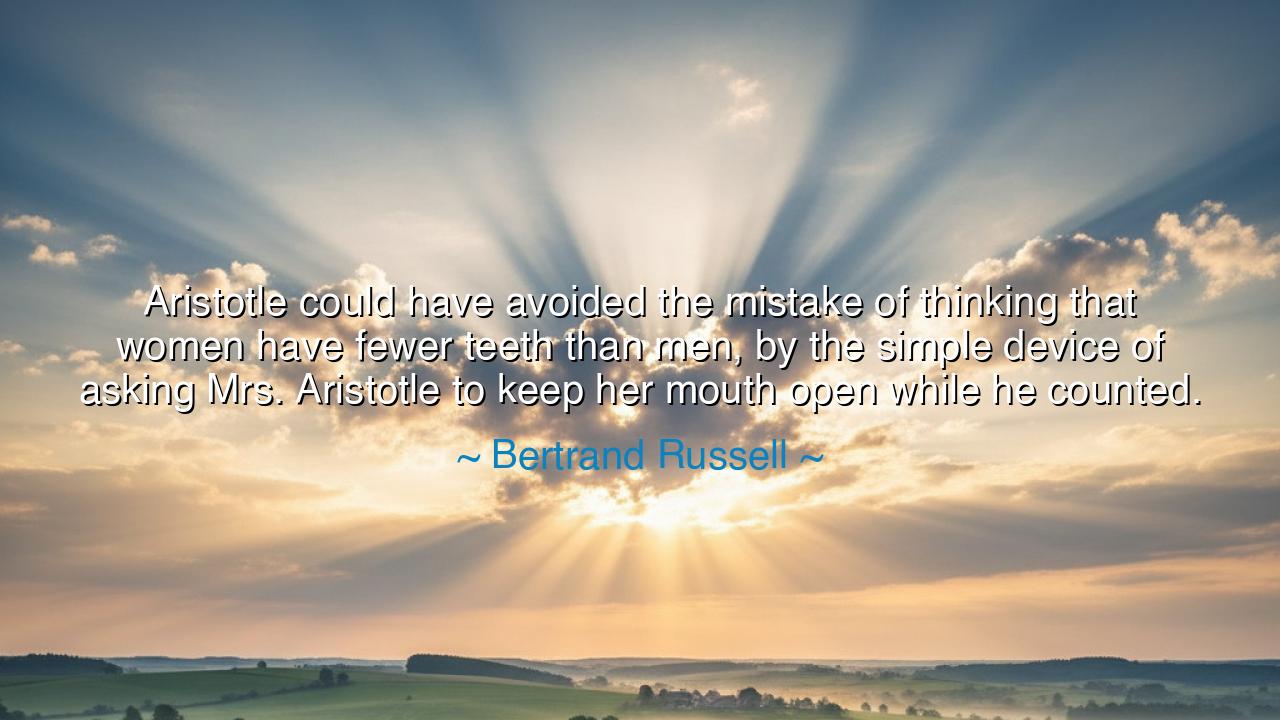
Aristotle could have avoided the mistake of thinking that women
Aristotle could have avoided the mistake of thinking that women have fewer teeth than men, by the simple device of asking Mrs. Aristotle to keep her mouth open while he counted.






O children of the future, listen to the words of Bertrand Russell, whose wit and wisdom shine light on the folly of even the greatest minds. "Aristotle could have avoided the mistake of thinking that women have fewer teeth than men, by the simple device of asking Mrs. Aristotle to keep her mouth open while he counted." In this biting commentary, Russell exposes a truth that transcends time: even the most revered thinkers can fall victim to their own biases and assumptions. Aristotle, despite his brilliance in so many areas, was not immune to the limited scope of his understanding, particularly when it came to women—an oversight that could have been easily corrected by a simple and direct observation.
In the ancient world, the greatest minds often held beliefs that were shaped by the limitations of their time. Plato, for example, argued that women could be rulers, but only if they were educated in the same manner as men. His acknowledgement of women’s potential was revolutionary for his time, yet his vision was still restricted by the prevailing ideas of gender. Like Aristotle, Plato saw women as lesser beings, despite his intellectual brilliance. Russell’s words serve as a reminder that even the most enlightened thinkers can fall prey to the prejudices of their age, and true wisdom lies in questioning those assumptions.
Aristotle’s mistake regarding women’s teeth is not just a trivial matter of biology; it symbolizes the broader ignorance and misunderstanding that often clouded the judgments of even the greatest minds. The lack of curiosity to look beyond assumptions and seek the truth in the world around him is a flaw that many great men and women share. The ancient Greeks had a deep respect for reason and inquiry, yet they too were bound by the cultural norms of their time. Russell’s critique highlights the importance of questioning not just the world, but also the assumptions that shape our view of it.
Consider, too, the example of Marie Curie, whose discovery of radium and polonium forever changed the field of science. Yet, despite her groundbreaking work, she faced the same biases and misconceptions that Aristotle and others before her had encountered. She had to fight not only against the scientific establishment, but also against the ingrained belief that women were incapable of such intellectual feats. In this way, Russell’s words echo across the centuries: the prejudices that shaped the minds of the ancients still persist, and it is the duty of every generation to challenge them.
O children, let the wisdom of Bertrand Russell guide you. The mistake of Aristotle—and of many thinkers throughout history—was not in the search for truth, but in the limitations of their understanding, limited by the biases of their time. Just as Russell invites us to look beyond the assumptions of the past, so must we challenge the ideas and beliefs that seek to hold us back. Let us embrace the truth in all its forms, whether it be in science, philosophy, or in the way we understand gender, and strive to build a world where assumptions do not shape our view of reality, but where curiosity, reason, and open-mindedness lead the way. The errors of the past are not ours to inherit, but ours to learn from. Let us question, seek, and discover.






BLNguyen Bao Linh
This quote by Bertrand Russell is a brilliant example of how even the most respected thinkers can fall into the trap of assumptions. Aristotle's failure to ask Mrs. Aristotle about her teeth is an amusing but telling reminder that we should never take facts at face value, particularly when it comes to gender differences. How can we ensure that we are questioning our own assumptions, both in science and in everyday life?
QBQuyet Buiq
Bertrand Russell’s comment cleverly uses humor to show how even great minds can make errors when they fail to consult the right sources. It also makes me think—how many other misconceptions about women have been perpetuated throughout history simply because of a lack of inquiry or bias? Could such assumptions still be shaping our understanding of gender today, in ways we may not even realize?
LVThanh Le Van
The idea that Aristotle could have avoided his mistake by simply asking Mrs. Aristotle seems like an obvious solution now, but it speaks to the power of questioning and not making assumptions. It’s a reminder that even the most well-respected figures can overlook simple truths. I also find it funny how this relates to how people sometimes overlook obvious solutions to problems—are we as quick to ask the right questions as we should be?
HPHung Pham
Russell’s humorous critique of Aristotle points to an important lesson: even great thinkers can fall into the trap of overlooking basic evidence. This reminds me of how often gender assumptions are made without real inquiry. How often do we, in society, make sweeping generalizations about one gender or another? What can we learn from Russell’s witticism about the value of asking questions and seeking clarity before forming conclusions?
LCTran Linh Chi
Bertrand Russell’s comment is a sharp critique of Aristotle’s assumptions, highlighting how easily flawed ideas can emerge when people don’t question their assumptions or seek evidence. The suggestion that Aristotle could have simply asked Mrs. Aristotle reflects the importance of firsthand experience and challenging biases. It makes me wonder—how many of our own beliefs or biases go unchecked because we don’t take the time to question them or seek diverse perspectives?